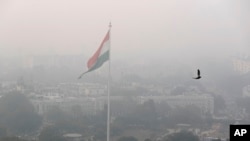Authorities in the Indian capital ordered schools to shut down until Tuesday, began handing out pollution masks to school children and declared a public health emergency as air pollution levels rose to hazardous levels in the city of 20 million people.
New Delhi, one of the world’s most polluted capital cities, has been shrouded in a gray haze of toxic smog this week as the air quality dips to its worst level since January.
Warning of the adverse health consequences of dirty air, an expert panel appointed by the Supreme Court on Friday said, “Special care should be taken of the children, aged and vulnerable population” and cautioned people not to exercise outdoors.
Delhi Chief Minister Arvind Kejriwal announced that authorities will distribute 5 million pollution masks to school children and their parents. He blamed the dirty air on smoke that billows into the city at this time of the year as farmers in surrounding states set fire to crop stubble on many hectares to prepare fields for sowing.
Kejriwal tweeted, “Delhi has turned into a gas chamber due to smoke from crop burning in neighboring states. It is very important that we protect ourselves from this toxic air.”
Several city doctors, who have long cautioned that the toxic environment is exposing citizens to a range of respiratory ailments, said that pollution masks may not be enough to protect citizens from the air and advised people to stay indoors as much as possible.
Health experts say particulate matter called PM 2.5 that becomes embedded deep inside lungs is the most dangerous pollutant. Its level on Friday was 19 times the safe limit set by the World Health Organization.
Authorities also rolled out a series of emergency measures to control the pollution. Construction work has been halted in the city to control dust, coal-based power plants and fireworks have been banned during the winter months and, starting Monday, Delhi will restrict the use of private cars for two weeks.
The plan to allow cars with odd and even numbered plates on alternate days had been announced earlier in a bid to control the seasonal pollution that hits the city every winter as calm winds trap the pollutants.
Delhi's dirty air is a toxic cocktail of fumes from 10 million private vehicles, construction dust and burning waste. Over the past decade, the situation has worsened as a poor public transportation system has not been able to keep up with the city's exponential growth, raising dependence on private vehicles.
While much attention has focused on Delhi’s pollution, experts point out that many other cities in northern India are also choking on severe air pollution. India is home to 14 of the 15 most polluted cities in the world, according to the United Nations.
Schools Close in Indian Capital as Air Pollution Turns Hazardous
update







